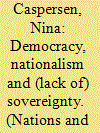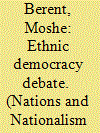| Srl | Item |
| 1 |
ID:
104113


|
|
|
|
|
| Publication |
2011.
|
| Summary/Abstract |
Unrecognised states are among the least likely candidates for democratisation: they tend to be driven by ethno-nationalism, many are marked by the legacy of war and most are facing international isolation. Nevertheless, the claim to democracy has become a central part of their legitimising narrative. This article examines this apparent paradox and finds that neither ethno-nationalism nor non-recognition represents insurmountable barriers to democratisation. However, what we tend to find in these entities is a form of stagnated 'ethnic democratisation'. These findings throw new light on the relationship between democracy and nationalism; they highlight the importance of (lack of) sovereignty; and they are used to evaluate Sammy Smooha's concept of 'ethnic democracy'.
|
|
|
|
|
|
|
|
|
|
|
|
|
|
|
|
| 2 |
ID:
099838


|
|
|
|
|
| Publication |
2010.
|
| Summary/Abstract |
Sammy Smooha's "ethnic democracy" model challenged the notion of the uniqueness of Israel by setting it as the archetype of a special type of democracy: "ethnic democracy". But contrary to what Smooha suggests, Israel's national identity is indeed unique. In each of Smooha's East European examples, besides the concept of a core ethnic nation, exists the notion of a civic territorial nation, which makes possible the integration or 'assimilation' into the dominant culture of those who are not members of the core ethnic nation. Yet, Israel's national identity does not recognise the existence of a civic territorial nation and makes no provisions for the integration or assimilation of non-Jews, especially Arabs, into the dominant Hebrew culture. Setting Israel as an archetype for his model prevents Smooha from exploring the possibility that, unlike Israel, East European "ethnic democracy" could be a transitional phase towards a liberal democracy.
|
|
|
|
|
|
|
|
|
|
|
|
|
|
|
|
| 3 |
ID:
120569


|
|
|
|
|
| Publication |
2013.
|
| Summary/Abstract |
IT IS IMPORTANT, in appraising the role of South Africa as today's player on the international political scene and an active participant in global associations of countries, to form a realistic idea of the political image the country projects internationally and the political situation inside the country. The hardest part is to make sense of the political situation inside South Africa, taking into account the evolving phenomenon of ethnic democracy.
|
|
|
|
|
|
|
|
|
|
|
|
|
|
|
|
| 4 |
ID:
114924


|
|
|
|
|
| Publication |
2012.
|
| Summary/Abstract |
The failure of democracy in Fiji is usually attributed to an ethnically fractured polity in which indigenous Fijians have asserted superior rights over those of immigrant communities, especially those of Indian descent. In 1987, an indigenous-dominated military ousted a government elected largely on the strength of Indo-Fijian votes, as did a civilian-led coup in 2000. Another in 2006, however, has confounded explanations of Fiji's politics based on a simple dichotomy of interests between indigenous Fijians and Indo-Fijians when the military toppled a government controlled by indigenous nationalists. A constitutional review process, supervised by the military and purportedly leading to a new, liberal constitution enshrining political equality for all ethnic groups in Fiji, is now in train. This article focuses on the historic production of indigenous nationalism and the demand for "ethnic democracy" and an assessment of the prospects for future constitutional government along inclusive liberal lines.
|
|
|
|
|
|
|
|
|
|
|
|
|
|
|
|